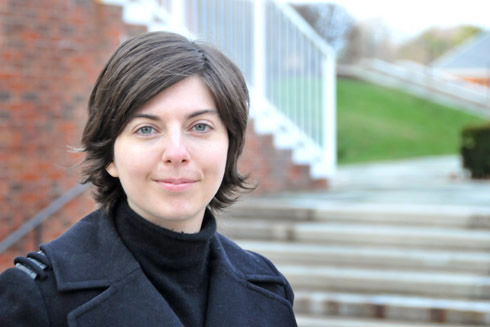Courtney Fullilove: Historian Specializing in 19th-Century United States

Courtney Fullilove has joined the History Department as assistant professor. She specializes in research related to the study the development of technical knowledge in the fields of agriculture, medicine, and manufacturing in the 18th and 19th century United States.
A graduate of Columbia University’s Ph.D program in history, Fullilove was attracted to Wesleyan for many reasons, among them its historical significance and liberal arts idealism. She says that being a part of a place where “everyone is creative and engaged” is satisfying to her.
“I’m a historian, so I like to think about the fact that Wesleyan was founded as a tiny bastion of Methodism in the 1830s, ” she says. “There’s a way in which Wesleyan retains the best qualities of small 19th century religious and Utopian communities: it has purpose, and people believe in being here.”
In terms of her work, Fullilove has broad interests that focus on one specific purpose: “people’s access to the things they need to live: food, medicine, clothes, shelter.”
“Since human necessities often entail a lot of know-how in addition to material resources,” she says. “I’m interested in how the know-how has been organized over time, and who has had control of it. Much of my recent work has involved the U.S. Patent Office in some way, but patents are just one legal mechanism to secure ownership of knowledge, which is my real interest.”
Fullilove researches how “farmers made seeds and plows, and how local healers made tinctures and poultices.” She uncovers “the ways local knowledge was codified, represented, or effaced in institutions of commerce and law.” Not surprisingly, Fullilove says her research gets “pretty down and dirty.” She is currently writing about George Bommer’s patent manure, which was a commercial fertilizer.
In the fall semester, Fullilove taught a course titled “American Food” and next semester she’ll be teaching “Materia Medica” (about the history of drugs and medicines) and “Confidence and Panic in 19th Century U.S. Economic Life.”
Speaking about her economy-focused course, she says: “I think we all need to spend more time understanding the conditions that have created so much certainty and uncertainty.”
Wesleyan’s intellectual and material history weighed heavily on her American Food class experience.
“The class was held in the basement of Judd Hall, and I think the Registrar must have had a sense of humor because it turns out to be the former home of the respiration calorimeter, a machine invented in the 1890s by Professor of Chemistry Wilbur Olin Atwater in his influential experiments on human metabolism and nutrition,” Fullilove says. “It’s been amusing for us all to sit at the birthplace of the calorie contemplating the strange career of corn-fed beef.”
Fullilove lives in a “Henry Austin-designed Islamic revival Italianate villa next to a funeral home (former governor’s mansion)” in New Haven, Conn. She says she’s enjoying getting to know the historic neighborhood that residents have worked so strongly to preserve. In her spare time she enjoys “puttering” around farmers markets and bicycling.

